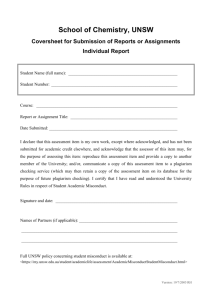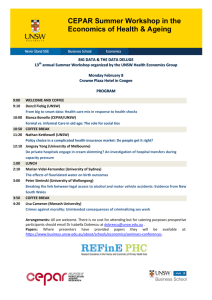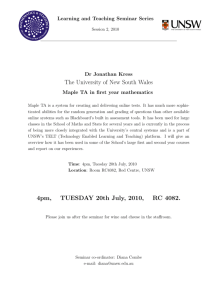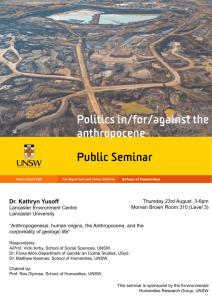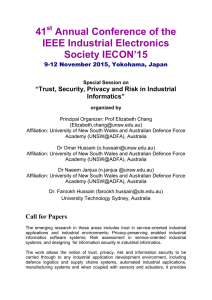Essential UNSW Information for ADFA
advertisement
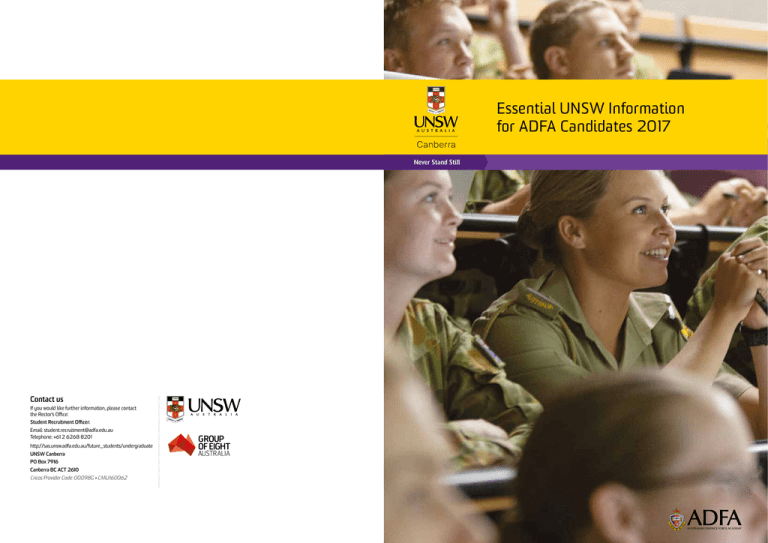
Essential UNSW Information for ADFA Candidates 2017 Never Stand Still Contact us If you would like further information, please contact the Rector’s Office: Student Recruitment Officer: Email: student.recruitment@adfa.edu.au Telephone: +61 2 6268 8201 http://sas.unsw.adfa.edu.au/future_students/undergraduate UNSW Canberra PO Box 7916 Canberra BC ACT 2610 Cricos Provider Code: 00098G • CMU160062 Contents Introduction..........................................................................................................2 Top 10 reasons.....................................................................................................3 Undergraduate programs .................................................................................4 Indicative Minimum Entrance Ranks 2017......................................................................................... 4 ADFA Degree / Job Chart............................................................................................................................ 5 Assumed Subject Knowledge 2017................................................................6 Assumed Subject Knowledge Expressed by Degree.......................................................................... 6 ADF Service Requirements.......................................................................................................................... 6 Assumed Subject Knowledge Expressed by State.............................................................................. 7 HSC Plus 2017....................................................................................................8 What is HSC Plus?......................................................................................................................................... 8 Why did UNSW introduce HSC Plus?.................................................................................................... 8 Am I eligible for bonus points under HSC Plus?................................................................................. 8 How many bonus points might I be awarded and for which Year 12 courses?...................... 8 Are all UNSW undergraduate degrees included in HSC Plus?..................................................... 8 How do I apply for HSC Plus?.................................................................................................................... 9 Example............................................................................................................................................................. 9 ACCESS Scheme 2017.......................................................................................10 What is the ACCESS Scheme?................................................................................................................... 10 Who is eligible to apply for the ACCESS Scheme?............................................................................ 10 Who is not eligible to apply for the ACCESS Scheme?.................................................................... 10 Types of disadvantage considered under ACCESS............................................................................ 10 How does the ACCESS Scheme work?.................................................................................................... 11 How do I apply?.............................................................................................................................................. 11 Elite Athletes and Performers................................................................................................................... 11 Elite Athletes and Performers bonus points........................................................................................ 12 Alternative entry 2017......................................................................................13 University Preparation Program (UPP)................................................................................................. 13 Limited ATAR................................................................................................................................................... 13 Certificate IV in Tertiary Preparation (TPC).......................................................................................... 13 Other Tertiary Preparation Programs.................................................................................................... 13 Transferring from outside UNSW ........................................................................................................... 14 Post Year 12 Applicants............................................................................................................................... 14 The ADFA/UNSW Canberra admission process.........................................15 Universities Admission Centre (UAC).............................................................16 Further information about offers...................................................................17 Contact us.............................................................................................................18 Notes......................................................................................................................19 Essential UNSW Information for ADFA Candidates | 1 Introduction The Australian Defence Force Academy (ADFA) is a unique partnership between the Australian Defence Force (ADF) and UNSW Australia, providing training and education for the future leaders of the Navy, Army and Air Force. Working at the intersection of a leading university and a military academy, UNSW has been educating defence leaders for half a century. UNSW is one of Australia’s most respected universities. Our focus on real world research coupled with industry support sees us ranked as one of the world’s top 50 universities with a ranking of 46 in the 2015 QS World University Rankings. UNSW Canberra is the Canberra-based campus of UNSW and is located at the Australian Defence Force Academy. Through our experience in education and achievements in research, we excel in teaching undergraduate, postgraduate and doctoral research students across arts, business, engineering, IT and science. Our undergraduate programs are tailored to the educational needs of members of the Australian Defence Force, while our graduate and doctoral research programs attract students from all walks of life and all parts of the world. UNSW Canberra is the only national academic institution with an integrated defence focus. Its strength is in defence-related, security and engineering research. It also has the highest teacher to student ratio in the country. UNSW Canberra research collaborators include NATO; the US Air Force and US Army Research Office; the Defence Science and Technology Organisation; the Defence Materiel Organisation; and the Department of Veteran Affairs. 2 | Essential UNSW Information for ADFA Candidates Top 10 reasons to choose ADFA/UNSW Canberra for your undergraduate degree... 1 2 3 4 5 6 7 8 9 10 Learn to be a leader and set yourself up for a wide range of career opportunities. Receive a top quality education and study for a degree from UNSW Australia. Start an extraordinary military career that will take you around Australia and the world. Be paid to study, and have your tuition fees paid by the Australian Defence Force (ADF). Study with the best university teacher-to-student ratio in the country and learn from lecturers at the top of their fields. Meet a diverse range of people and make mates who will last a lifetime. Undertake adventure training and personal development programs with the Navy, Army and Air Force. Challenge yourself with exciting and rewarding experiences not available in other universities. Graduate with a guaranteed job in the Navy, Army or Air Force. Take advantage of unique postgraduate courses and scholarship opportunities. Essential UNSW Information for ADFA Candidates | 3 Undergraduate programs The following scores are from 2016 and should only be used as an indicative guide to the minimum entry level required for UNSW Canberra programs for 2017. Indicative minimum entrance ranks 2017 Standard Programs UAC Code Program Program Code Yrs ATAR OP * IB 450001 B Arts 4400 3 75 12 25 450010 B Business 4405 3 80 10 28 450020 B Science 4410 3 75 12 25 450030 B Information Technology 4426 3 75 12 25 450040 B Engineering Hons (Aeronautical Engineering) 4472 4 85 8 31 450050 B Engineering Hons (Civil Engineering) 4473 4 85 8 31 450060 B Engineering Hons (Electrical Engineering) 4471 4 85 8 31 450070 B Engineering Hons (Mechanical Engineering) 4474 4 85 8 31 450080 B Technology (Aeronautical Engineering) 4430 3 85 8 31 450090 B Technology (Aviation) 4437 3 80 10 29 OP * = Overall Position (QLD only). Please note these minimum OPs should be used as a general guide only as the conversion can vary from year to year. ATAR = Australian Tertiary Admission Rank – all states/territories except QLD. IB = International Baccalaureate (Diploma only). 4 | Essential UNSW Information for ADFA Candidates ADFA Degree / Job Chart Note: Army jobs are a guide only. Army Officers are General Service Officers and the job Corps is not determined until Officer training TheDEGREE Royal Military College - Duntroon (RMC-D). ADFA DEGREE ADFA /atJOB CHART / JOB CHART Note: Army jobs are aNote: guideArmy only.jobs Armyare Officers a guideare only. General ArmyService OfficersOfficers are General and the Service job Corps Officers is not anddetermined the job Corps until is not determined until Officer training at RMC. Officer Entrance training scores at RMC. are shown Entrance as scores a guideare only shown and may as abe guide subject onlytoand change. may be subject to change. DEGREE INDICATIVE DEGREE ATAR/OP INDICATIVE NAVY JOB ATAR/OP Arts 70/14 Arts 70/14 NAVY JOB ARMY JOB ARMY AIR JOBFORCE JOB Pilot AIR FORCE JOB Pilot Joint Battlefield Airspace Controller Joint Battlefield Airspace Controller Intelligence Officer Intelligence Officer Personnel Capability OfficerPersonnel Capability Officer Business 75/12 Business 75/12 Armoured Corps Officer Armoured Corps Logistics Officer Officer Logistics Officer Artillery Officer Artillery Officer Air Combat Officer Air Combat Officer Aviation Corps Officer (GSOAviation Pilot) Corps Pilot Officer (GSO Pilot) Catering Officer Electrical and Mechanical Engineer Electrical andIntelligence MechanicalOfficer Engineer Officer Officer Pilot Pilot Engineer Corps Officer Maritime Aviation Warfare Officer Maritime Aviation Infantry Warfare Officer Officer Science Information Technology 70/14 Science 70/14 Information Technology Pilot Catering Officer Joint Battlefield Airspace Controller Joint Battlefield Airspace Controller Intelligence Officer Engineer Corps Personnel Officer Capability OfficerPersonnel Capability Officer Infantry Officer Logistics Officer Logistics Officer Maritime Warfare Officer Maritime Warfare Intelligence OfficerCorps Officer Intelligence Corps Air Combat OfficerOfficer Air Combat Officer Maritime 70/14 Logistics Officer Maritime Logistics Mechanical OfficerEngineer OfficerMechanical Engineer Pilot Officer Pilot 70/14 Medical Corps Officer Medical Corps Joint Officer Battlefield Airspace Controller Joint Battlefield Airspace Controller Military Police Officer Military Police Intelligence Officer Officer Intelligence Officer Ordnance Corps Officer Ordnance Corps Air Combat Officer Officer Air Combat Officer Signals Corps Officer Signals CorpsJoint Officer Battlefield Airspace Controller Joint Battlefield Airspace Controller Transport Corps Officer Transport Corps PilotOfficer Pilot Air Combat Officer Air Combat Officer Intelligence Officer Intelligence Officer Personnel Capability OfficerPersonnel Capability Officer Logistics Officer Aeronautical Engineering 85/8 Aeronautical Engineering Logistics Officer Aerospace 85/8 Engineer OfficerAerospace Engineer Aerospace Officer Engineer OfficerAerospace Engineer Aerospace Officer Engineer OfficerAerospace Engineer Officer (Aeronautical) (Aeronautical) (Aeronautical) (Aeronautical) (Aeronautical) (Aeronautical) Marine Engineer Officer Marine Engineer Officer N/A Aerospace Engineer OfficerAerospace Engineer Officer (Armament) (Armament) Civil Engineering 85/8 Civil Engineering N/A 85/8 Electrical Engineering 85/8 Electrical Engineering Weapons 85/8Electrical AircraftWeapons Engineer Electrical Electrical Aircraft and Mechanical Engineer Engineer Electrical andAerospace Mechanical Engineer Engineer OfficerAerospace Engineer Officer Officer Officer Officer Officer (Electronics) (Electronics) Marine Engineer Officer Engineer Corps Officer Marine Engineer Officer Engineer Corps Airfield Officer Engineer Officer Airfield Engineer Officer Aerospace Engineer OfficerAerospace Engineer Officer (Armament) (Armament) Weapons Electrical EngineerWeapons Officer Electrical Engineer Officer Mechanical Engineering 85/8 Mechanical Engineering Marine 85/8 Engineering Officer Marine Engineering Electrical Officer and Mechanical Engineer Electrical andAerospace Mechanical Engineer Engineer OfficerAerospace Engineer Officer Officer Officer (Armament) (Armament) Aerospace Engineer OfficerAerospace Engineer Mechanical Officer Engineer OfficerMechanical Engineer Aerospace Officer Engineer OfficerAerospace Engineer Officer (Aeronautical) (Aeronautical) (Aeronautical) (Aeronautical) Technology (Aeronautical) 85/8 Technology (Aeronautical) Pilot 85/8 Pilot Aviation Corps Officer (GSO Pilot) Aviation Corps Pilot Officer (GSO Pilot) Pilot Maritime Aviation Warfare Officer Maritime Aviation Warfare Officer Intelligence Officer Maritime Warfare Officer Maritime Warfare Officer Personnel Capability OfficerPersonnel Capability Officer Air Combat Officer Intelligence Officer Air Combat Officer Joint Battlefield Airspace Controller Joint Battlefield Airspace Controller Technology (Aviation) 80.75/10 Technology (Aviation) Pilot 80.75/10 Pilot Aviation Corps Officer (GSO Pilot) Maritime Aviation Warfare Officer Maritime Aviation Warfare Officer Aviation Corps Pilot Officer (GSO Pilot) Air Combat Officer Pilot Air Combat Officer Joint Battlefield Airspace Controller Joint Battlefield Airspace Controller CALL 13 19 01 ORCALL VISIT13DEFENCEJOBS.GOV.AU/ADFA 19 01 OR VISIT DEFENCEJOBS.GOV.AU/ADFA Essential UNSW Information for ADFA Candidates | 5 Assumed Subject Knowledge 2017 Assumed Subject Knowledge is the level of subject knowledge that a lecturer or a tutor of a first year UNSW Canberra at ADFA course could reasonably expect all students enrolled in that course to know at the outset. If you do not have the minimum level of Assumed Subject Knowledge, you are NOT prevented from applying for admission or enrolling in any courses, when the degree program begins, but you will be placed at a considerable disadvantage. If you have not achieved the recommended minimum level of Assumed Subject Knowledge, you are strongly advised that it is in your best interest to undertake a bridging program or other preparation courses, such as UniLearn: www.unilearn.net.au. Assumed Subject Knowledge expressed by degree Year 11 and 12 subject choices are important to meet UNSW Canberra Assumed Subject Knowledge requirements. Bachelor of Engineering (Aeronautical), (Civil), (Electrical) or (Mechanical) Bachelor of Technology (Aeronautical) and (Aviation) Bachelor of Information Technology Mathematics Physics Mathematics Physics Mathematics Chemistry (desirable but not essential) Chemistry (desirable but not essential) Bachelor of Science* Bachelor of Arts Bachelor of Business English *BSc - Assumed Subject Knowledge for specific areas undertaken within this degree: Mathematics Physics Chemistry Oceanography Mathematics Physics Mathematics Mathematics Mathematics Physics ADF Service Requirements You should be aware that in addition to the UNSW Canberra at ADFA Assumed Subject Knowledge requirements, there may be some Year 12 subjects that are an ADF Service requirement. Contact Defence Force Recruiting on 13 19 01 for further information. 6 | Essential UNSW Information for ADFA Candidates Assumed Subject Knowledge expressed by state The following table lists the specific Year 12 subjects that currently satisfy the UNSW Canberra at ADFA Assumed Subject Knowledge requirements. This table should be read in conjunction with the specific Assumed Subject Knowledge for each degree. Where a specific degree lists a subject as assumed knowledge this table will enable you to determine which Year 12 subject this equates to in your state or territory. Requirements are expressed as minimum where there is more than one level. For example, to satisfy the Mathematics requirement, a NSW student would have to complete at least ‘Mathematics’, while a Queensland student would have to complete at least ‘Mathematics B’. Whilst the Assumed Subject Knowledge is the minimum requirement, Year 12 students are recommended to undertake higher levels of these subjects. State ACT NSW QLD SA/NT TAS VIC WA Assumed Knowledge Recommended Studies –– English (major) –– English (major/minor) –– Mathematical Methods (major) –– Specialist Mathematics (major/minor) –– Physics –– Specialist Mathematics (double major) –– Chemistry –– English Advanced –– English Extension 1 –– Mathematics –– Mathematics Extension 1 –– Physics –– Mathematics Extension 2 –– Chemistry –– English –– Mathematics B –– English Extension –– Physics –– Mathematics C –– Chemistry –– English Studies –– Mathematical Studies –– Specialist Mathematics –– Physics –– Chemistry –– One of the TCE English Group choices –– Mathematical Methods –– Mathematics I or II –– Physics –– Calculus and Applications 1A or 1B –– Chemistry –– Mathematics Specialised –– One of the VCE English Group choices –– Mathematical Methods –– Specialist Mathematics –– Physics –– Chemistry –– English or English Literature –– Mathematics: 3C/3D –– Mathematics: Specialist 3A/3B –– Physics –– Mathematics: Specialist 3C/3D –– Chemistry As at December 2015 Essential UNSW Information for ADFA Candidates | 7 HSC Plus 2017 What is HSC Plus? HSC Plus is a program of awarding bonus points for strong performance in Australian Senior Secondary Certificate (Year 12) courses relevant to UNSW undergraduate degrees. HSC Plus awards a maximum of 5 bonus points for students who perform well in subjects during their Australian Senior Secondary Certificate that are relevant to their preferred UNSW degree. Why did UNSW introduce HSC Plus? There is a strong correlation between Year 12 course performance and preparation for and success in first year university studies. Students who have undertaken and done well in relevant Year 12 courses are generally well prepared for the demands of university study. A successful first year of university study lays the foundation for a successful and rewarding UNSW experience. By employing strategies that enhance the academic achievement of UNSW students we also improve their employability and increase the range of career options for our graduates. Am I eligible for bonus points under HSC Plus? Interstate Year 12 applicants If you are an interstate Year 12 applicant you can visit the UAC website to see which of your subjects and performance bands are comparable to NSW HSC subjects. First click on the UNSW program you are interested in then open another window to see details for interstate subjects at: www.uac.edu.au/undergraduate/admission/ interstate.shtml International Baccalaureate (IB) applicants* If you are an International Baccalaureate applicant you can visit the UAC website to see which of your subjects and performance bands are comparable to NSW HSC subjects. How many bonus points might I be awarded and for which Year 12 courses? Applicants will be awarded a maximum of five bonus points for each UNSW preference. The number of bonus points awarded and the Year 12 courses considered are specific to individual undergraduate degrees. This means if you apply for a range of degrees at UNSW you may have a different selection rank for each preference depending on the Year 12 courses you have completed. If you complete an Australian Senior Secondary Certificate (Year 12) in the year prior to admission* to UNSW, and you complete relevant Year 12 courses as part of that qualification, you may be eligible for bonus points for admission under HSC Plus. To be considered you must be eligible to receive an ATAR or equivalent. If you complete the International Baccalaureate (IB) in the year prior to admission* you may also be eligible. To be considered you must be eligible for the award of the IB Diploma. *Applicants who completed the above qualifications in 2015 and took a gap year in 2016 are also eligible for HSC Plus for admission in 2017. 8 | Essential UNSW Information for ADFA Candidates How do I apply for HSC Plus? No separate application is required. For admission to undergraduate degrees at UNSW all applicants completing an Australian Senior Secondary Certificate (Year 12) - either in Australia or off-shore - must lodge an application via UAC. Applicants completing the International Baccalaureate also apply via UAC. If you have a preference for a degree included in HSC Plus at the close of change of preferences AND your performance in a Year 12 course or courses is in the specified band, bonus points will be automatically added to your ATAR or equivalent to increase your selection rank for that preference. Example The following example illustrates how HSC Plus works. The applicant below completed the NSW Higher School Certificate. For this applicant you can see the HSC courses undertaken, the performance band achieved in each and the applicant’s overall performance as measured by the ATAR. Also listed is the applicant’s list of UNSW Canberra preferences, HSC Plus bonus points awarded for each preference and the applicant’s increased selection ranks. Tom receives an ATAR of 75.85 in 2015. HSC Courses Performance Bands English Advanced Band 3 Biology Band 4 Chemistry Band 3 Mathematics Band 6 Mathematics Ext 1 Band E2 Physics Band 4 Tom’s UAC preferences for UNSW Canberra: UAC Code UNSW Canberra Program HSC Plus Bonus Points Bonus point allocated Tom’s Selection Rank 450001 B Arts 0 0 75.85 450020 B Science 1 1 - Mathematics 76.85 450060 B Eng (Electrical) 3 1 - Mathematics 2 - Physics 78.85 450090 B Tech (Aviation) 3 1 - Mathematics 2 - Physics 78.85 Bonus points do not change your ATAR. When institutions allocate bonus points they are added to your selection rank not your ATAR. In the example above, Tom’s ATAR is still 75.85. It is the selection rank for his preferred course that has changed in this example. Essential UNSW Information for ADFA Candidates | 9 ACCESS Scheme 2017 What is the ACCESS Scheme? UNSW is committed to the goals of equal opportunity and affirmative action in education. The ACCESS Scheme (established in 1987) is part of this commitment and is provided for students new to higher education who have experienced long-term educational disadvantage. The ACCESS Scheme allows UNSW to take the circumstances of individual applicants into account when allocating places in undergraduate programs. Who is eligible to apply for the ACCESS Scheme? To be eligible to apply for consideration under the ACCESS Scheme you must: –– –– –– be an Australian or New Zealand citizen, or a permanent resident of Australia (includes holders of a permanent humanitarian visa) have experienced long-term educational disadvantage so that your Year 11 and/or Year 12 studies (or equivalent) have been affected by circumstances beyond your control Types of disadvantage considered under ACCESS The range of circumstances considered under ACCESS includes: –– financial hardship/low socioeconomic status –– English language difficulties –– refugee status –– disability or long-term illness/medical condition –– severe family illness/death –– attendance at a rural or disadvantaged high school Current Year 12 students attending a school that: –– has been identified by the NSW Department of Education and Communities (DEC) as among the most socio-economically disadvantaged in the NSW Government sector, or –– has been identified by DEC as geographically isolated or participating in the Connected Communities program, or –– was formerly included in the Australian Government’s National Partnership for Low Socio-economic Status School Communities Program, or –– has been identified as comparable to schools in the above categories by the Catholic Education Commission of NSW or –– is in a town which has a population of less than 10, 000 people and is at least 100km from the nearest centre with a population of 10, 000 or –– is in a town which has a population of less than 5, 000 people and a distance between 50km and 99km from the nearest centre with a population of 10, 000. achieve an ATAR or equivalent Who is not eligible to apply for the ACCESS Scheme? You are not eligible to apply for consideration under the ACCESS Scheme if: –– you are an international fee-paying student –– you are currently enrolled in or have previously undertaken university, TAFE, college or other tertiary level studies either here or overseas (tertiary being defined as Diploma level or above) –– you are an Aboriginal or Torres Strait Islander and are applying for entry through the Nura Gili Indigenous Admission Scheme 10 | Essential UNSW Information for ADFA Candidates How does the ACCESS Scheme work? Elite Athletes and Performers Applicants for UNSW’s ACCESS Scheme lodge an EAS application (refer to ‘How do I apply?’ on the following page) and their circumstances are assessed centrally at UAC according to guidelines agreed to by all UAC participating institutions. UNSW uses the centralised EAS assessment to award successful ACCESS applicants EAS bonus points to their admission rank. The EAP Program awards up to five bonus points to students who have excelled in areas of sport, academia, performance, leadership, and/or music on a national or international level. Activities and/or commitments should have been undertaken in Years 11 and 12. This means that an applicant’s selection rank is increased and they compete with all other applicants for a place in the course. The allocation of EAS bonus points does not guarantee entry to UNSW or to an applicant’s preferred course - applicants must meet the published cut-off for the course they are applying to. How do I apply? If you wish to apply for consideration under the ACCESS Scheme you must lodge two applications with the Universities Admissions Centre (UAC). 1. UAC Undergraduate - admission to university application Applicants apply for university entry through the UAC. See the UAC website for details. www.uac.edu.au/undergraduate/ 2. UAC Educational Access Schemes (EAS) application –– Elite athletes will have participated in sport at the level of national or international competition –– Elite performers (including leaders) will have participated in significant national or international productions, competitions or events. An elite performer is a student who has demonstrated excellence through performing arts, scholastic achievement or leadership on a national or international level The Elite Athletes and Performers Bonus Points table provides a guide to the bonus points available under the program. Application process All Elite Athletes and Performers applicants must complete the online application form and ensure that certified documentation is attached to the online application or emailed to: eap@unsw.edu.au by the closing date. For students applying for entry to UNSW for 2017, EAP applications will be opening mid-2016. Please continue to check the following address for updates: www.futurestudents.unsw.edu.au/bonus-points Applicants who have experienced educational disadvantage can lodge an application for Educational Access Schemes (at one or more universities) through UAC. Applicants complete a common form for Educational Access Schemes (EAS) at all participating universities. Booklets containing an EAS application form are available from careers advisers at your school or from UAC. There is no charge for lodging an EAS application. Please note that UNSW does not accept late direct applications for the ACCESS Scheme under any circumstances. Lodge application via the following website: www.uac.edu.au/eas/ Essential UNSW Information for ADFA Candidates | 11 2016 Elite Athletes and Performers bonus points table Please be advised that the EAP Program is now under review for entry in 2017. The bonus points table for entry to UNSW in 2016 can be viewed below. The revised table for 2017 will be available in October 2016. 5 points 4 points 3 points 2 points National Schools Australian Junior Chess Australian Junior Chess Debating League - International League - National Championship Representative Representative Participant Academic Member of Australian Maths and Science Olympiad Team Australian Science Australian Mathematics Olympiad Summer Competition - Prize School Participant Australian Mathematics Competition - Medal World Schools Debating Championship Participant Queen’s Scout Award NYSF International Representative 1 point Australian Junior Chess League - State Representative Australian Science Olympiad National Qualifying Exam High Distinction NYSF National Representative ICAS Medal Duke of Edinburgh Gold (approval by DOE board is required) State Youth Governor Leadership Queen’s Guide Award Cadet Under Officer (CUO) School Captain Regimental Sergeant Major / Cadet Warrant Officer Class 1 Member of Australian Team open or underage (all sports) State Open (Senior State Representation) State Age Representation e.g. Ranked in the Top 10 in NSW u17s (any sport) Australia (individual) State School Representative Teams Talented Athlete Development Program Member of National League Team Coach Career Management Program National Umpiring/ Refereeing Certificate of Performance (CVCA, CDPA)* AMEB Grade 8 with Distinction (A or A+)* Trinity Guildhall ATCL with Distinction ABRSM Grade 8 with High Distinction or Distinction IMEB AMus Diploma Trinity Guildhall ATCL with Pass Member of Australian Youth Orchestra / National Choir (e.g. Gondwana Voices) Trinity Guildhall Grade 8 with Distinction AIS State Institutes / Sports Academics Sport AFL Players’ Association Australian Cricketers’ Association Rugby Union Players’ Association Australian Schoolboys/-girls Rugby League Professional Players’ Association Australian Professional Footballers’ Association (A or W League) LMus Diploma Pass Music Leader of Section in Australian Youth Orchestra Trinity Guildhall LTCL with Pass Trinity Guildhall LTCL with Distinction IMEB LMus Diploma AMus Diploma Pass * No points awarded ‘For Leisure’ UNSW reserves the right to change any degree, admission requirement, bonus points or any other information without notice. 12 | Essential UNSW Information for ADFA Candidates Alternative entry 2017 UNSW does not admit students on the basis of age. All students are assessed on the basis of academic merit and you must have a qualification we accept to be considered for admission. If you do not already have an accepted qualification or your qualifications are below our minimum entry requirements there are a number of alternative entry qualifications that can help you gain entry to UNSW. The best option for you will depend on your age, previous qualifications and the program you would like to study. Admission is based on your overall academic record, that is your secondary and post-secondary studies. For UNSW Canberra at ADFA candidates, admission is based on the highest entrance rank - whether it is your Year 12 ATAR/OP or other academic qualification, such as TAFE. University Preparation Program (UPP) UNSW’s UPP is designed to assess your academic potential and to provide you with a realistic university environment to develop the skills needed to manage tertiary studies. It is open to domestic students who will be 21 years or older on 1 March in the year of admission to an undergraduate degree and who do not have qualifications which allow university entry. The UPP does not guarantee admission to UNSW but can be used as evidence of recent study when applying for admission. Limited ATAR You can obtain a Limited ATAR by completing the Certificate of Matriculation program at TAFE. To be eligible for a Limited ATAR based on your 2016 HSC studies undertaken in the Certificate of Matriculation, you must meet the following conditions: –– be at least 20 years of age on 1 March 2016 –– be taking between five and nine units of ATAR courses, including at least two units of English –– attempt all units in one sitting Certificate IV in Tertiary Preparation (TPC) The Certificate IV in Tertiary Preparation (TPC) course will help you develop a broad range of skills necessary to gain entry to and succeed in tertiary education and employment. Students who successfully complete the TPC will be eligible to receive the scaled Tertiary Entrance Score (TES). The Universities Admission Centre (UAC) uses the TAFE calculated TES to assist universities in making offers of places to TPC graduates. The TPC conducted by TAFE can be completed in one year of full-time study or two years of part-time study. To be eligible you will need to: –– be at least 21 years of age or older on 1 March in the year of admission to an undergraduate degree –– complete 10 semester units of study –– obtain a score of 196/300 as a minimum entrance requirement or above 270/300 for more competitive degrees Other tertiary preparation programs You can also gain entry into many of our degrees by completing one of the tertiary preparation programs listed below. To be eligible you must be 21 years or older on 1 March in the year of admission to an undergraduate program. –– University Preparation Scheme (UPS) Australian National University –– Open Foundation Program - University of Newcastle. You must successfully complete the program with at least 20 units of humanities courses Essential UNSW Information for ADFA Candidates | 13 –– –– University Preparation Course (UPC) University of Sydney. To be considered for admission to UNSW with the UPC, you must successfully complete a minimum of two courses, including one humanities course Certificate IV in Adult Tertiary Preparation TAFE Queensland Please note that successful completion does not guarantee admission to UNSW. Admission is competitive and places are allocated based on academic performance. Transferring from outside UNSW From another university UNSW considers students from other universities (in Australia and overseas) who wish to transfer to an undergraduate degree. If you hold overseas qualifications from a country where English is not the standard language of instruction, you will need to provide proof of English language proficiency - check our English language proficiency requirements. To have your university studies considered for admission, you should preferably complete one year of full-time study, but a minimum of 0.75 full-time equivalent load within one degree at your university. All applications are through UAC. Special Consideration for Applicants with Tertiary Study (SCATS) SCATS is for applicants who have undertaken university studies and who are applying for admission to an undergraduate degree. SCATS provides a mechanism for applicants whose secondary and/ or tertiary performance has been affected by longterm educational disadvantage due to circumstances beyond their control to have this taken into account in the admissions process. Applicants who have been excluded from UNSW or another tertiary institution are required to submit a SCATS application explaining the circumstances surrounding their exclusion. From TAFE or a professional college By completing an Advanced Diploma or Diploma, accredited by the Australian Qualifications Framework (AQF), you can be considered for admission to UNSW. All applications are through the Universities Admissions Centre (UAC). Due to the high demand for places in most programs, entry via this route is very competitive. Successful applicants generally require a minimum credit average with no failures. Trade certificates are not considered unless awarded at Certificate IV level or higher. 14 | Essential UNSW Information for ADFA Candidates Credit transfer If you have completed studies at another institution you may be eligible for credit towards your UNSW degree. Credit transfer is not determined until after an offer of admission is made. The amount of credit awarded depends on how closely the subjects you have completed are related to the equivalent courses in your UNSW degree. Post Year 12 applicants Qualifications Assessment Service (QAS) UAC’s Qualifications Assessment Service (QAS) provides prospective applicants with an assessment of their qualifications. This may be used as a guide by admissions officers for determining eligibility for courses offered by UAC’s participating institutions. www.uac.edu.au/general/qas.shtml Important points about the QAS: –– UAC can only assess qualifications from the documents provided and UAC may decline to assess qualifications if the information for a valid assessment is not provided –– The assessment is not an application for study at UAC’s participating institutions –– The assessment is valid as of the date of issue and is based on the confidential common assessment procedures and guidelines approved by UAC’s participating institutions –– The assessment is a guide only, and UAC’s participating institutions are not bound by the assessment Overseas qualifications If you’re an Australian citizen who completed Year 12 equivalent overseas, or completed the International Baccalaureate (IB) anywhere in the world, you can apply through UAC. International Baccalaureate (IB) Diploma students IB Diploma candidates are not eligible to receive an ATAR. Students awarded an IB Diploma or Bilingual Diploma will receive a UAC rank based on their total IB score. For more information read International Baccalaureate Diploma Bilingual Diploma FAQs at: www.UAC.edu.au/undergraduate/admission/ ib.shtml The ADFA UNSW Canberra admission process DEFENCE PROCESS UNIVERSITY PROCESS Contact Defence Force Recruiting Call 13 19 01 or visit www.defencejobs.gov.au Think about your degree options www.unsw.adfa.edu.au Attend a Your Opportunities Unlimited (YOU) session (preferably in Year 11 or early Year 12) Assessment Day Psychological Interview, Medical Assessment and Defence Interview Attend an Officer Selection Board (OSB) Receive job offer from the Australian Defence Force Match ADF job with relevant degree Decide which degree you will apply for Apply for UNSW Canberra at ADFA through the Universities Admissions Centre (UAC) * www.uac.edu.au Accept ADF offer Accept UAC/UNSW offer (subject to passing Physical Fitness assessment and final medical) Welcome to ADFA *University Applications open mid August in year prior to admission Essential UNSW Information for ADFA Candidates | 15 Universities Admissions Centre (UAC) Important Dates For UAC Applications Applications open for Semester 1, 2017 Early August 2016 On time applications close September 2016 Late applications close (processing charge + approx. $130 late fee) October 2016 Late applications close (processing charge + approx. $150 late fee) November 2016 Final closing date for applications close (processing charge + approx. $170 late fee) Early February 2017 Closing date for change of preference for consideration in January round 1 Early January 2017 2016 Year 12 applicants - Processing Charge - approximately $32, Non Year 12 applicants - Processing Charge approximately $64 16 | Essential UNSW Information for ADFA Candidates Further information about offers What if I’m not made an offer by Defence? If you do not receive an Australian Defence Force job offer you may be able to reapply to Defence Force Recruiting in the following year. In the meantime you can enrol at another university in a degree program as close as possible to that which you would have taken at UNSW Canberra. If you are successful in your subsequent DFR application and UAC application for the following year, you may be eligible for credit for courses completed at the other university. Universities Admissions Centre (UAC) offers UAC releases offers to students via four rounds: January round 1 The majority of UNSW Canberra offers are made in this early January round as students commence at ADFA in late January. UAC offers for this round are released on their website in the first week of January. You have approximately one week to accept the offer via the UNSW online portal. If you know that you have received an ADF letter of offer and have met the entrance score (ATAR/OP) for your chosen degree preference, but have not received an offer in this round please contact UNSW Canberra Student Administrative Services on +61 2 6268 6000. Main round (mid - January) If your ADF service is sending out late job offers (end December/early January) then you may receive your UNSW Canberra university offer in this main round. February round 1 It is uncommon for ADFA candidates to receive an offer in either of these rounds due to the early commencement date of all ADFA students. Once you have received a UAC offer you will receive instructions from UNSW Canberra on how to accept your UNSW Canberra offer and a schedule with other critical dates. Generally you will arrive at ADFA in the third week of January and commence five weeks of basic military training before your university classes commence in early March. Essential UNSW Information for ADFA Candidates | 17 Contact us If you would like further information, please contact the Rector’s Office: Student Recruitment Officer Email: student.recruitment@adfa.edu.au Telephone: +61 2 6268 8201 www.unsw.adfa.edu.au The Rector’s Office UNSW Canberra PO Box 7916 Canberra BC ACT 2610 Cricos Provider Code: 00098G 18 | Essential UNSW Information for ADFA Candidates Notes Essential UNSW Information for ADFA Candidates | 19 Notes 20 | Essential UNSW Information for ADFA Candidates Essential UNSW Information for ADFA Candidates 2017 Never Stand Still Contact us If you would like further information, please contact the Rector’s Office: Student Recruitment Officer: Email: student.recruitment@adfa.edu.au Telephone: +61 2 6268 8201 http://sas.unsw.adfa.edu.au/future_students/undergraduate UNSW Canberra PO Box 7916 Canberra BC ACT 2610 Cricos Provider Code: 00098G • CMU160062
